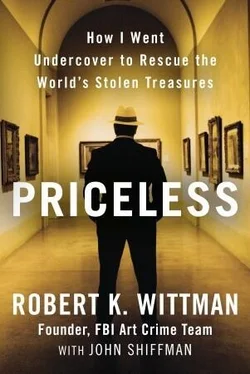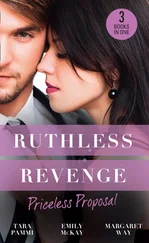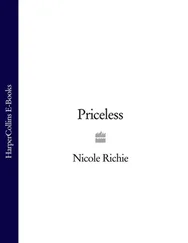The United States wasn’t the only country at the conference that was urged to do more. With a few notable exceptions, art crime simply isn’t a priority for most nations. As one of the Italians told the summit: “What we have is a paradigm of collective delinquency.”
After lunch—turkey scaloppine, zuppa di formaggio , a light rosé—we heard from a pair of Australian academics who provided an overview on looting. The subject matter wasn’t new to me, but I was pleased to see them offer a non-Western perspective at this Eurocentric gathering. It’s folly to try to address a global problem without taking into consideration cultural differences. In some Third World countries, the illicit art and antiquities trade is quietly accepted as a way to boost the economy. Semi-lawless, war-torn regions have long been vulnerable. In Iraq, antiquities are one of the few indigenous, valuable commodities (and easier to steal than oil). In less dangerous but developing countries like Cambodia, Ethiopia, and Peru, where looters have turned archaeology sites into moonscapes, local governments don’t view every excavation as a crime against history and culture. Many view it as an economic stimulus. As the professors noted, the diggers are indigenous and unemployed, desperate to convert rubble from dead ancestors’ graves to food for starving families. At the conference, this perspective triggered hand-wringing from politically correct diplomats, bemoaning corrupt local officials who take bribes. So much so that I had to snicker when Kenyan National Museum director George Okello Abungu rightly rose to chastise the group. “Don’t be so quick to judge the corrupt customs man,” he said. “Remember who bribes him: the Westerner.”
Art and antiquity crime is tolerated, in part, because it is considered a victimless crime. Having personally rescued national treasures on three continents, I know firsthand that this is foolishly nearsighted. Most stolen works are worth far more than their dollar value. They document reflections of our collective human culture. Ownership of a particular piece may change over decades and centuries, but these great works belong to all of us, to our ancestors and to future generations. For some oppressed and endangered peoples, their art is often the only remaining expression of a culture. Art thieves steal more than beautiful objects; they steal memories and identities. They steal history.
Americans, in particular, are said to be uncultured when it comes to high art, more likely to go to a ballpark than a museum. But as I tell my foreign colleagues, the statistics belie that stereotype. Americans visit museums on a scale eclipsing sports. In 2007, more people visited the Smithsonian Institution museums in Washington (24.2 million) than attended a game played by the National Basketball Association (21.8 million), the National Hockey League (21.2 million), or the National Football League (17 million). In Chicago, eight million people visit the city’s museums every year. That’s more than one season’s attendance for the Bears, Cubs, White Sox, and Bulls combined.
As the agenda inched toward my presentation, I realized that I could place each of the speakers into one of three boxes—academic, lawyer, or diplomat. The academics spouted the statistics and theory diagrams. The lawyers offered deathly dull, law review-style histories of international treaties related to art theft. The diplomats were completely useless. They seemed harmless enough, encouraging genteel cooperation. Yet they seemed to have two true goals. One: offend no one. Two: craft a bland statement for submission to a U.N. committee. In other words, no action.
Where was the passion?
We love art because it strikes a visceral chord in everyone, from the eight-year-old kid to the octogenarian. The simple act of putting paint on canvas or transforming iron into sculpture, whether by a French master or a first-grader, is a marvel of the human mind and creates a universal connection. All art elicits emotion. All art makes you feel.
This is why, when a work of art is stolen or an ancient city is stripped of its artifacts and its soul, we feel violated.
As I waited for the Interpol chief to wrap up so I could begin my presentation, I looked out across the room at all the dignitaries. The heavy snow was now piled as high as the windows. I began to daydream. How , I wondered, did the son of a Baltimore orphan and a Japanese clerk wind up here, as his country’s top art crime sleuth?
Chapter 3
THE MAKING OF AN AGENT
Baltimore, 1963 .
“JAP!” I’d heard it before, but the slur from the large white woman with an armful of groceries hit me with such force, I stumbled. I squeezed my mother’s hand and dropped my eyes to the sidewalk. As the woman brushed past, she hissed again.
“Nip!”
I was seven years old.
My mother, Yachiyo Akaishi Wittman, did not flinch. She kept her gaze level and her face taut, and I knew that she expected me to do the same. She was thirty-eight years old and, as far as I knew, the only Japanese woman in our working-class neighborhood of two-story brick starter homes. We were newcomers, having moved from my mother’s native Tokyo to my father’s Baltimore a few years earlier. My parents had met in Japan during the last months of the Korean War, while Dad was stationed at the Tachikawa U.S. air base, where Mom was a clerk. They married in 1953 and my older brother, Bill, was born the same year. I was born in Tokyo two years later. We inherited my mom’s almond eyes and thin build, and my father’s Caucasian complexion and wide smile.
Mom didn’t speak English well, and this isolated her, slowing her assimilation in the United States. She remained mystified by basic American customs, such as the birthday cake. But she certainly recognized and understood the racial slurs. With memories of World War II still raw, we had neighbors who’d fought in the Pacific or lost family there. During the war my American dad and my Japanese mom’s brothers had served in opposing armies. Dad dodged kamikazes driving a landing craft that ferried Marines to Pacific beaches; one of Mom’s older brothers died fighting Americans in the Philippines.
My parents sent my brother and me to proper Catholic schools in Baltimore, but surrounded us with all things Japanese. Our cabinets and shelves overflowed with Japanese ceramics and antiques. The walls were covered with woodblocks by Hiroshige, Toyokuni, and Utamaro, the Japanese masters who inspired van Gogh and Monet. We ate dinner on a table crafted from dark Japanese mahogany and sat on funky curved bamboo chairs.
The overt racism that we encountered enraged my father, but his anger rarely flared in front of me. Dad didn’t talk about it much and I knew he’d faced far greater hardship as a kid. When he was three or four years old, his parents died one after the other, and he and his older brother, Jack, became wards of Catholic Charities. At St. Patrick’s Orphanage, my dad learned to fend for himself. When forced to participate in chorus, he sang loudly off key. When unjustly persecuted by a brutal male teacher, he socked the man in the nose. Dad quickly became too much for the nuns to handle, and they shipped him to a foster home, separating him from his brother. Dad bounced from family to family, more than a dozen in all, until he turned seventeen, old enough to join the U.S. Navy, in 1944.
As I moved through elementary school and junior high in the 1960s, I followed the daily struggles of the civil rights movement in the papers and on television. The FBI and its special agents always seemed involved. They protected victims of racism and prosecuted the bigots and bullies. I asked my mother about the FBI agents and she said they sounded like honorable men. On Sunday nights in the late 1960s, my mom, dad, brother, and I gathered by our new color television to watch episodes of The F.B.I. , the no-nonsense series starring Efrem Zimbalist Jr., with scripts personally approved by J. Edgar Hoover. On TV, the FBI always got its man, and the agents were noble protectors of justice and the American way. At the end of some shows, Zimbalist asked for the public’s help to solve a crime, a sort of precursor to America’s Most Wanted . I loved it. We rarely missed an episode.
Читать дальше












